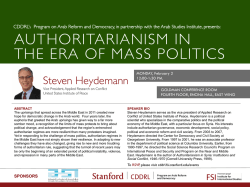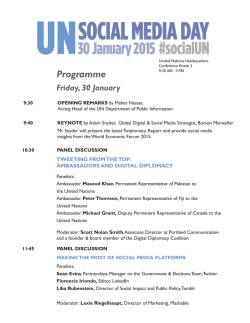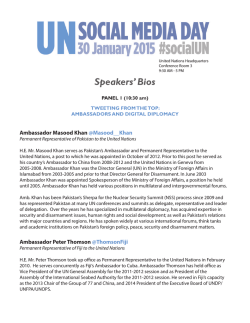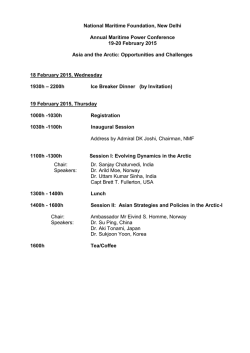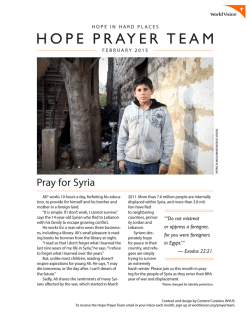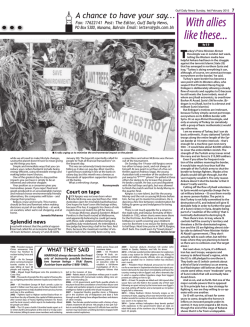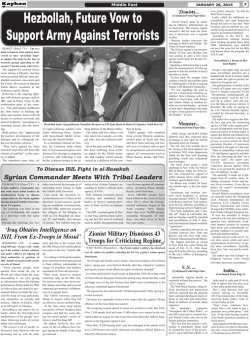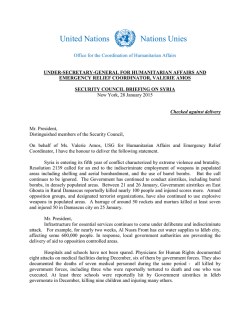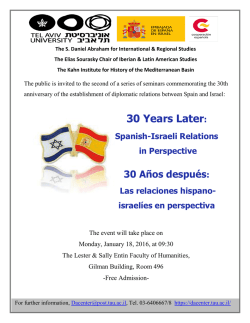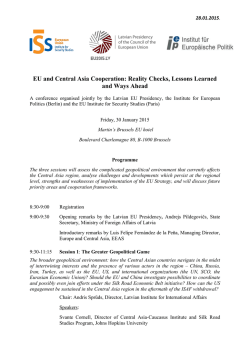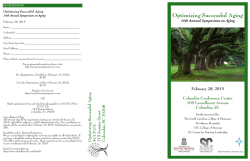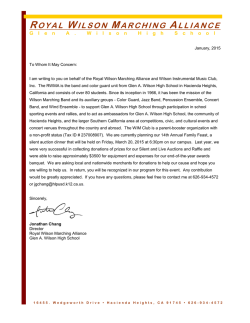
The Past and Future of the Middle East
WHY HISTORY MATTERS: The Past and Future of the Middle East Wednesday, February 25, 2015 7:00 p.m. Fowler Museum at UCLA Panelists Robert S. Ford is a Senior Fellow at the Middle East Institute in Washington where he studies and writes about the Levant and North Africa. Ambassador Ford recently retired from the Foreign Service after serving as the U.S. Ambassador to Syria from 2010 to 2014. In this role he was the State Department lead on Syria, proposing and implementing policy and developing common strategies with European and Middle Eastern allies to contain and try to resolve the Syria crisis. Prior to this, Ambassador Ford was the Deputy Ambassador to Iraq from 2008 to 2010, having previously worked as the US Ambassador to Algeria from 2006 to 2008. Ford was the Deputy Ambassador in Bahrain from 2001 until 2004, and from 2004 to 2006 he was the Political Counselor to the U.S. Embassy in Baghdad where he helped stand up the new, permanent Iraqi government. In 2014 he received the Secretary’s Service Award, the U.S. State Department’s highest honor. He also received in 2012 from the John F. Kennedy Library in Boston the annual Profile in Courage award for his working defending Syrian human rights. He has appeared on CNN, PBS, Fox, MSNBC, NPR, the BBC and Arabic news networks as well as in the New York Times and Foreign Policy. He and his wife live in Baltimore. Steven Heydemann serves as the vice president of Applied Research on Conflict at United States Institute of Peace (USIP). Heydemann is a political scientist who specializes in the comparative politics and the political economy of the Middle East, with a particular focus on Syria. His interests include authoritarian governance, economic development, social policy, political and economic reform and civil society. From 2003 to 2007, Heydemann directed the Center for Democracy and Civil Society at Georgetown University. From 1997 to 2001, he was an associate professor in the department of political science at Columbia University. Earlier, from 1990-1997, he directed the Social Science Research Council’s Program on International Peace and Security and Program on the Near and Middle East. Marina Ottaway is a Senior Scholar at the Woodrow Wilson Center and a long-time analyst of political transformations in Africa, the Balkans, and the Middle East. She is working on a project at the Wilson Center about the countries of the Arab Spring and Iraq. Ottaway joined the Wilson Center after 14 years Page 1 at the Carnegie Endowment for International Peace, during which she played a central role in launching the Middle East Program. Prior to that, she carried out research in Africa and in the Middle East for many years and taught at Georgetown University, the Johns Hopkins School for Advanced International Studies, the American University in Cairo, the University of the Witwatersrand in South Africa, the University of Zambia, and Addis Ababa University. Her extensive research experience is reflected in her publications, which include nine authored books and six edited ones. Her most recent publications include Getting to Pluralism, co-authored with Amr Hamzawy and Yemen on the Brink, co-edited with Christopher Boucek. While at Carnegie, she also supervised their Guide to Egypt’s Transition, a website that provides background and analysis on issues that will shape Egypt’s political future, and Iraqi Elections 2010, an online guide to Iraqi politics. Ottaway received her Ph.D. from Columbia University. Moderator James L. Gelvin is Professor of Modern Middle Eastern History at the University of California, Los Angeles. He received his B.A. from Columbia University, his Master's in International Affairs from the School of International and Public Affairs at Columbia University, and his Ph.D. from Harvard University. He has taught at Boston College, Harvard University, MIT, and the American University in Beirut. A specialist in the modern social and cultural history of the Arab East, he is author of four books: The Arab Uprisings: What Everyone Needs to Know (Oxford University Press, 2012, 2015); The Modern Middle East: A History (Oxford University Press, 2004, 2007, 2011, 2015); The Israel-Palestine Conflict: One Hundred Years of War (Cambridge University Press, 2005, 2007, 2014); and Divided Loyalties: Nationalism and Mass Politics in Syria at the Close of Empire (University of California Press, 1998), along with numerous articles and chapters in edited volumes. He is also co-editor of Global Muslims in the Age of Steam and Print, 1850-1930 (University of California Press, 2013). Page 2
© Copyright 2026
